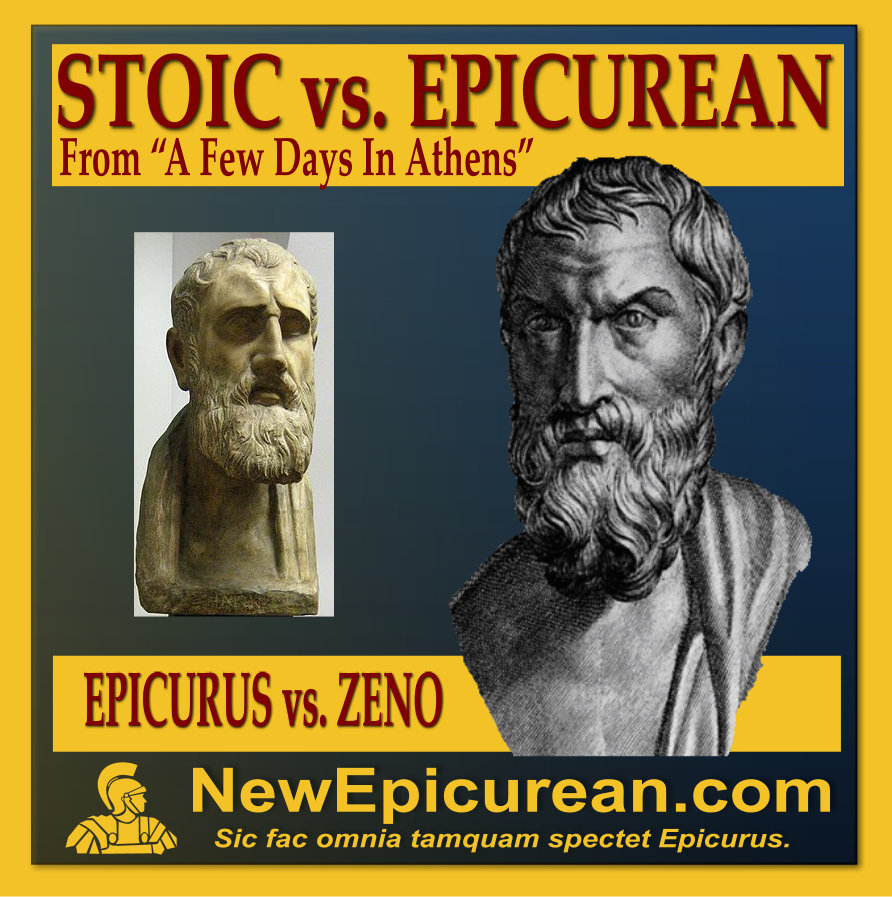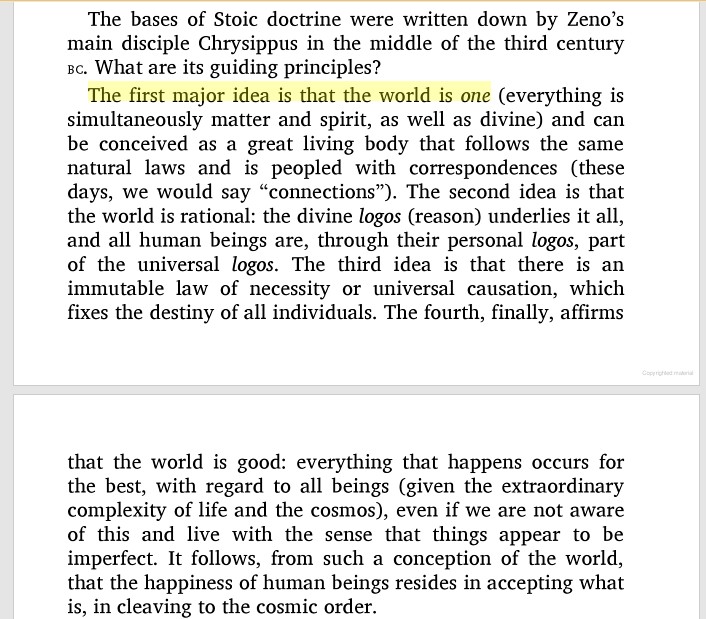Stoicism is as far from Epicurean philosophy as East is far from West.
We frequently see commentary, even in Epicurean discussion forums, with Stoic overtones. It therefore pays to keep in mind the differences between the two philosophies so we can recognize Stoic errors and not let them distract us. Here is a clip from “Happiness: A Philosopher’s Guide” by Frederic Lenoir, which does a great job of summarizing the essential core of Stoicism. In case you need a reminder of how Stoicism is the opposite of everything that Epicurus taught, go down the following list and check off the primary ideas of Stoicism in order:
1) “The first major idea is that the world is *one* (everything is simultaneously matter and spirit as well as divine) and can be conceived as a great living body….” Wrong in every essential point!
2) “The second idea is that the world is rational, the divine logos underlies it all, and all human beings are part of the universal logos.” Hogwash!
3) “The third idea is that there is an immutable law of necessity or universal causation which fixes the destiny of individuals.” Once again, the monstrosity of determinism, which is totally false.
4) “The fourth affirms that the world is good, and everything happens for the best…..” Absolute nonsense.
5) “It follows, from such a conception of the world, that the happiness of human beings resides in accepting what is, in cleaving to the cosmic order.” Yes, that’s true, it certainly DOES follow, in the same way that garbage out follows garbage in.
Over time I will try to come back to this post and add cites to the Epicurean doctrines that are the opposite of each of these points, but they should jump out at anyone familiar with Epicurean ideas. In the meantime, check out the links to other posts on this blog listed below.
Stoicism is as far from Epicurean philosophy as East is far from West.
UPDATE 1:
Why do I speak harshly about “Stoicism”? Hopefully many of you don’t even know what Stoicism is, and consider it to be just another forgotten ancient philosophy. Unfortunately, that is not entirely the case. The essence of Stoicism is well summarized in the graphic which I will link below, and which started the recent exchange. You could substitute any number of other philosophies or religions as a similar target, but in truth the basic ideas of all of these get smashed together in a stew as “stoicism.” That stew represents the great majority of thought in both religion and secular philosophy in the modern world. Epicurus spoke for the right of each individual to pursue pleasant living, but he was not so blind as to believe that every individual can achieve that. There are many obstacles to pleasant living. And what is the greatest obstacle?
Viewpoints that allege that there is a “higher purpose” than to live pleasantly, and that seek to substitute their own view of what men should strive for in place of that which Nature provided when she gave us the faculty of happiness. Modern stoicism seeks to brush under the rug its soggy foundations, and to try to convince people that “virtue” is worth living for in and of itself. The modern stoics assure you that you can reject their “divine fire” origin of the universe, you can reject their Spock-like worship of “logic” over the facts of reality, and you can reject their praise of a life of anesthesia from all pain (AND joy) as the goal of living. You can reject all these, they say, because “our goal is happiness too!”
But what a perversion of a word! Modern Stoicism likes to talk about “happiness” without ever defining the term in recognizable ways. But when you dig deep enough, you will always find that Stoic happiness has nothing to do with pleasure. Instead, you will find the stoics snuggling up to “pain” as if it is somehow valuable in itself. They have always done this and they always will. And that is because the essence of Stoicism is the rejection of the faculty of pleasure given us by nature.
There were specific groups in the ancient world who were labeled “enemies of the human race” for their intolerant religious views. Well my friends the intolerance of the stoics for the pleasure of the ordinary man on the street beats far stronger in the heart of the establishment today than the irrationality of religion ever did. In seeking to dowse the flames of what they call emotional turbulence, they are really dowsing the flame of ALL emotion, especially the joy and delight that they hate so much. And their views have gradually leached so deeply into society that otherwise well-meaning people can no longer interpret even Epicurus himself in any way other than consistently with their ascetic view of human life. Even here, we see loose talk of “painlessness” as the goal of life, and “tranquility” as the absence of all engagement with the world, as if that were possible for any but the dead (whom the stoics emulate as best they can).
Epicurean philosophy arose in a garden where people were truly devoted to pleasure – the alpha and omega of a blessed life. Asceticism and hatred of joy and delight were the furthest things from their minds. The Epicurean movement would never have prospered in the ancient world had it been — it would have been immediately recognized by all as the hypocrisy which does truly exist, in Stoicism. Nietzche nailed this on the head far better than I can. For those who have not seen this quote, it is one to read over and over again, and to internalize til the understanding behind it becomes second nature:
“You desire to LIVE “according to Nature”? Oh, you noble Stoics, what fraud of words! Imagine to yourselves a being like Nature, boundlessly extravagant, boundlessly indifferent, without purpose or consideration, without pity or justice, at once fruitful and barren and uncertain: imagine to yourselves INDIFFERENCE as a power–how COULD you live in accordance with such indifference? To live–is not that just endeavoring to be otherwise than this Nature? Is not living valuing, preferring, being unjust, being limited, endeavouring to be different? And granted that your imperative, “living according to Nature,” means actually the same as “living according to life”–how could you do DIFFERENTLY? Why should you make a principle out of what you yourselves are, and must be? In reality, however, it is quite otherwise with you: while you pretend to read with rapture the canon of your law in Nature, you want something quite the contrary, you extraordinary stage-players and self-deluders! In your pride you wish to dictate your morals and ideals to Nature, to Nature herself, and to incorporate them therein; you insist that it shall be Nature “according to the Stoa,” and would like everything to be made after your own image, as a vast, eternal glorification and generalism of Stoicism! With all your love for truth, you have forced yourselves so long, so persistently, and with such hypnotic rigidity to see Nature FALSELY, that is to say, Stoically, that you are no longer able to see it otherwise– and to crown all, some unfathomable superciliousness gives you the Bedlamite hope that BECAUSE you are able to tyrannize over yourselves–Stoicism is self-tyranny–Nature will also allow herself to be tyrannized over: is not the Stoic a PART of Nature? . . . But this is an old and everlasting story: what happened in old times with the Stoics still happens today, as soon as ever a philosophy begins to believe in itself. It always creates the world in its own image; it cannot do otherwise; philosophy is this tyrannical impulse itself, the most spiritual Will to Power, the will to “creation of the world,” the will to the causa prima.”
There is one philosophy that does NOT become a system based on “logic” with true believers who think they can “reason” their way into telling Nature what to do. There is one philosophy that does NOT seek to create the world in its own image, and to dowse the flame of joy and delight which is the motive power of every living thing. There is one philosophy that does not rebel against, but indeed elevates to the center, the faculty that Nature gave us to live our lives. There is one philosophy that recognizes “Divine Pleasure, the Guide of Life” as the true “goddess of nature” for both men and all other living things, and yields to her the respect and gratitude to which she is entitled. And that is the philosophy of Epicurus.
UPDATE 2:
The following is an excerpt from the book entitled : “Stoa and Rome” by Dimitris Liantinis, as translated by EP:
The destruction of Hellenic and Roman civilization and culture in general, ladies and gentlemen, has been done by the ZERO!
Yes! Do not be amazed – by the ZERO ! By an abysmal hating ZERO which had for its target : the HUMAN and the BEING!
The destruction of the Hellenic and Roman civilization began from an old, paralyzed, and impoverished STOICISM, which through the dark catacombs ripped its clothes to fight that which is the most beautiful humanity ever created, as it crackled its teeth from hatred for the Joy of Knowledge and the Beauty of Life!!
And for all those things that humans created with their culture, and it was yet so hard to study! In medieval times, this ZERO tortured by the Inquisition the study of Nature and manliness of Science.
This is indeed the “ODIUM GENERIS HUMANI” (Hatred of the Human Race) as Tacitus said.
“Knowledge,” you say? “Blessed are the poor in spirit,” we shall say!
“Beauty, health and strength,” you say? “Lame, crippled, paralyzed, and blind,” we will say!
“Love,” you say? “The tortures of hell and more are waiting for you at the moment of your death, we say!
For honor and glory answered by inconspicuous and humility. The last would be first, they said! The pride and the honor propounded by the humiliation and abashment! Blessed you will be when they mock you, persecute you and backbiting you, they said!
The taste of the mouth and the delicious food responded with fasting and the locusts in the desert! The beauty of feelings and pleasures of life responded to the remorse of the flesh and the denigration of bodily expression! Slandered the flower of youth, and became a virginity and a chastity for the symptoms of Neurosis ! Freud saw too much and suffered to revive some of his patients and illness people!!
In joy and sparkle in the world and the intoxication of spring responded to the gloom and the black of widow! Blessed are the mourners, they told!
Finally, hunger, thirst and injustice, the longing of a christening justice are vanished with a surfeit of hungry and with a foggy dream!
Blessed are they that hunger and thirst for righteousness, they said. – “- Husband, I’m dizzy from the hunger// – Shut up, you will eat in the sky//, as the poet Kostas Varnalis said ironically, in one of his verses..].
https://www.facebook.com/groups/EpicureanPhilosophy/permalink/826859490696346/
Full listing of posts against Stoicism.
Posts of Particular Interest:
- The Letter of Cosma Raimondi Defending Epicurus Against Stoicism
- Is That All There Is? The Sad Ending of R.D. Hicks’ Stoics and Epicureans
- The Error of Seeing Epicurean Pleasure Through Stoic Eyes
- Stoic v Epicurean – The Confrontation Between Epicurus and Zeno in Frances Wright’s A Few Days In Athens
- Celebrating 2000 Years of Epicurean Contempt For Stoicism and Platonism: Lucian of Samosata and His Dialog “The Double Indictment”


